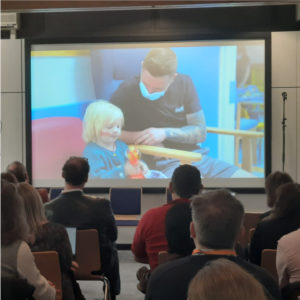Implementing whole genome sequencing in paediatric oncology practice across the UK
Improving access to genome diagnostics for paediatric cancers
In October, the NHS launched its first genomics strategy focused on the implementation and integration of genomic technologies and techniques into clinical healthcare. Included in the four priority areas for the next five years, is the pledge to ‘deliver equitable genomic testing for improved prediction, prevention, diagnosis and precision medicine’, across England. Fostering environments to support and facilitate action in the implementation of genomic medicine is also key to the Wellcome Connecting Science Learning and Training team’s mission.
Our recent workshop on “Implementing whole genome sequencing in paediatric oncology practice”, hosted at the Hinxton Hall Conference Centre, on the Wellcome Genome Campus, was therefore a timely opportunity to address this topic through the lens of paediatrics. Its specific focus was on strategies to enable fair access to genomic services (including whole genome sequencing (WGS)) for cancer diagnosis in children.
Since 2019 the NHS has been determined to roll out the use of WGS to support critically ill children (among other demographic groups), including those with specific forms of cancer. This new strategy places emphasis on the acceleration of this goal, and highlights the need for a ‘Genomic Medicine Service Infrastructure’ to enable success across England.

Delivered in collaboration with East Genomics, University of Cambridge Department of Paediatrics, Cambridge University Hospitals, and the Wellcome Sanger Institute Cellular Genetics programme the initial objective of our course was to help facilitate such an infrastructure, by providing a supportive and open discussion platform for those facing common issues surrounding genomics implementation in paediatric oncology.
The forum gave invited clinicians and scientists from England, Scotland, Wales, Northern Ireland and the Republic of Ireland access to leaders in field, to talk through the challenges and share best practice approaches to improve uptake across all regions; providing a foundation for this conversation to evolve through a planned future series of educational multi-disciplinary team meetings (MDTs).
Our main objective was to get colleagues from around the country together to discuss the NHS genome sequencing programme for children with cancer. It was wonderful that people took time out of their busy schedules to travel to the Wellcome Genome Campus. The meeting was, in my eyes, a roaring success. It got an important conversation going which I hope we will be able to continue with follow-up events in the future
Dr Sam Behjati, Paediatrician Scientist and Group Leader, Wellcome Sanger Institute Cellular Genetics programme
What followed was a day of discovery from those working on the frontline of genetic healthcare.
The expected narrative was a focus on the disparity of funding between the devolved nations and England. While this issue was discussed, it did not dominate as anticipated. The focus quickly turned to some of the hidden challenges present within England, including a realised lack of parity across the region.
We had expected much of the conversation to focus on the disparity of access to testing itself across the devolved nations, compared with England; but we also discovered issues with leadership adoption from the Trust, and ‘knowledge equity’ across all regions; which is a very valuable takeaway for framing future discussion at the forthcoming MDTs.
Dr Michelle Bishop, Associate Director of Learning and Training, Wellcome Connecting Science
In the morning experts and early adopters shared their experiences, including talks on the impact of applying WGS for establishing accurate diagnosis and prognosis in paediatric solid tumour cases, demonstrating the value of accelerating these clinical pathways for childhood cancer. By shedding light on the possibilities for all nations, it prompted candid conversation around what is preventing a seamless adoption.
The afternoon workshop, facilitated through structured group exercises, illuminated the following issues present across England and the devolved nations:
- Although there are some trailblazing “centres of excellence” successfully accelerating genomic medicine, this is not the case for all Trusts based in England;
- Issues present in senior Trust leadership are prohibiting some clinicians from receiving the necessary internal support needed to deploy their skills and expertise to progress fair access to genomic services;
- There is a lack of ‘knowledge equity’ amongst the healthcare professionals who are working on the front line of the service, which prevents an equity of access across the UK. Subsequently highlighting gaps that can be overcome through education and training;
- Whilst in England testing is available, its contribution towards cancer diagnosis in children is fundamentally contingent on the competence and confidence of the clinicians to whom their care is entrusted;
- In some instances, infrastructure is fragmented, meaning pathways are not in place to enable end-to-end use of test results, which is compounded by the complexities surrounding the requirement for different consents, as well as the capacity of clinicians to facilitate the full test journey;
- It is not solely about the process, but a lack of funding for the devolved nations is problematic before you can even think about what successful implementation looks like.
Now we have a clearer understanding of the problems behind the challenges that prevent effective implementation of pathways to enable fair access to WGS, we can take action to structure the forthcoming MDTs to focus on how we can improve ‘knowledge equity’ across all nations. This will of course involve conversation around funding and access to education and training, but these discussions can now be tailored to address the specific needs of each region, rather than focusing on the perception of training needs.
The coming together of these specialists in a face-to-face environment, has shone a light on areas that need prioritising urgently if we are to be successful in delivering equitable access to these tests
Dr Michelle Bishop, Associate Director of Learning and Training, Wellcome Connecting Science
A full write-up on all the challenges discussed during this workshop will be shared in the coming weeks. If you are interested to read this report, please sign-up to receive our regular email update here.
